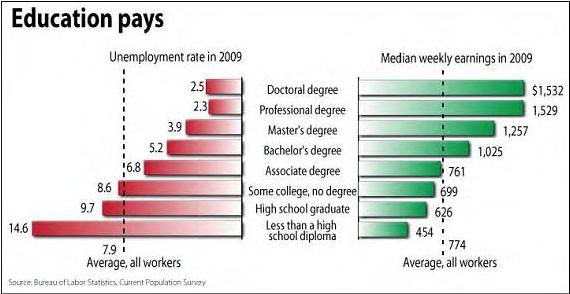You’ve put your time in serving your country. You’ve earned entitlement to the GI Bill, which can pay your way through college or other training. So what factors should you consider when you think about which school to attend and what career you should pursue?
How much will I earn with a degree?
Point of fact: People who graduate with a bachelor’s degree earn, on average, almost $500 more per week and are significantly more likely to be employed than someone with a high school diploma. The GI Bill can help you achieve this. Want more detailed information about how much you’ll earn with your degree? Try going to Payscale.com.
Even though you haven’t started school yet, you already have some homework to do, such as figuring out what your interests are and how they might serve you in the future.
Some of the tools available to you to see how your interests might be turned into a career include:
- The Department of Labor’s O*NET is a free database you can use to find salary information, career options based on your skills, interests, abilities and more.
- The Bureau of Labor Statistics Occupational Outlook Handbook has info on hundreds of different types of jobs. You can find out what training and education is needed for a particular job, earnings, expected employment prospects, what workers do on the job, and working conditions.
We also provide free counseling to:
- Assist you in career decision making for civilian or military occupations;
- Help you choose an appropriate civilian occupation and develop a training program, or;
- Resolve barriers that get in the way of your success in training or employment.
If you are interested in VA’s assistance, you can contact us here.
You’ve thought about possible careers, now what?
Choosing the right school involves more than just completing the school’s application process. The school you select is important, and a decision not to be taken lightly. You earned your college education. In the military you demonstrated the commitment, courage, discipline and desire to succeed. Each of these qualities is highly sought after by colleges and universities. Leverage that and attend the school that maximizes your hard-earned investment.
There is a lot of information available to assist you. Although it can be time-consuming, take the time to gather all the information you need to make the best choice.
The Department of Education’s College Navigator web portal is a great place to start. But before you access College Navigator, keep reading. The information available on College Navigator is important, but it’s equally important to understand what the data means. Identify questions you can ask potential schools so you understand how well it suits your specific situation. If you’d like to go directly to the College Navigator website click here.
Think about your choices. I’ll be doing a follow up post soon to talk about some specifics you should consider when you start comparing and choosing a school.
Keith Wilson was
Topics in this story
More Stories
Honor Flights honor America's Veterans by flying them to Washington, D.C., to visit the memorials built in their honor. Read a first-hand account and find out how to get involved as a participant or volunteer.
From Nov. 4 to 11, buildings and homes across the country will light up green to recognize the sacrifice and strength of our Veterans as they transition from military to civilian life.
Summer can be a joyful time of year, but some outdoor activities can be hard for some Veterans. In this guest post, former VA Secretary Bob McDonald shares resources and plans to navigate summer activities.







Will the 9/11 GI Bill cover tuition for a foreign degree program taken by distance learning? The school is acredited. Leicester University in UK.
I have a question involving dependant schools. Im rated 90% disabled,retired military, found a good cosmotology school at the Dept of Education site, and recently my daughter graduated with a certificate and state certification. BUT the VA has repeatedly denied dependancy for her school, during conversations I was told that the school is not on the Texas Higher Education certification page, and hence was not acceptable to the VA. I spoke with Mr. Davis at the Texas Higher Education Board and he told me technical schools with certification boards in Texas are certified through their respective board and not by THEB. I have contacted a state representative to get the mismatch fixed, but meanwhile no benefits for dependency. Can someone at the VA break the code on the Texas mismatch? Second, why does the VA maintain a seperate listing instead of using the Dept of Ed certification process? Ken
Choosing a school is an important especially for a Veteran. There are some things that a Vet should look into before making that choice: do they get instate tution immediately, or do they pay the out of state tuition rate until they qualify as a resident where the school is located; does the school have a full service Veterans Center in a prominent location and easily accessible on the campus; does the Veteran receive a priority in registering for classes, does the school have a Veterans Club; does the school have a Veterans Alumni Chapter; what is the school’s retention rate for Veterans; does the school offer any courses to help the Veteran succeed (graduate); what is the overall cost of living in the locale the university is located; are there reasonable, residential rental units available which are located within a reasonable distance from the school; are there readily available VA medical and healthcare facilities nearby; are there other Veterans going to school there and how many?
Welcome home and thanks for your service.
Dave Lucier, President
Arizona Veterans Foundation
Most of the universities I have contacted that have a military program charge a ridiculous price for semester Unit.; The one I am currently attending is $250.00 for semester unit, So a 3 unit class cost me $750.00 plus book. Just because one is a two month class, cater to military or dependents individuals.
What the school don’t tell you is that you can take the same class thru the civilian side of the university and paid a much lower cost per unit.
Once again we go into the same all issue, university see the opportunity to rip of the soldier or dependent charging so much money.
Has anyone look into this issue?
I am a veteran who attends a private HBCU in the South. Every year the school offers a “winter-mester” by way of a study abroad program. I know the 9/11 GI Bill covers study abroad. When I ask the VA how to use my benefits to pay for the study abroad courses they refer me to the school. But then the school refers me to the VA. What should I do?
Katie,
Please check out this link to a GI Bill powerpoint. The caption for your situation is below. I Googled “GI Bill study abroad” I’m not an expert, but it looks like your school would have to provide documentation stating why this semester abroad is necessary. Or, you may have to actually enroll at the foreign school (which is allowed with the 9/11 GI Bill). Good luck
http://www.gibill.va.gov/documents/presentations/post-911_info_detailed.pdf
“Does not include study abroad course(s) unless the
course(s) is a mandatory requirement for completion
of the approved program of education”
Just keep in mind that there is now a yearly cap on private and foreign schools, and that the 9/11 GI Bill will not likely cover much for a foreign institution.
I found this post on Pro-publica and have had a very similar experience. I’m just clipping highlights here, but its the same story from many that I have talked to…
“Excelsior College in NY has very cozy access to military personnel around the world, and while maintaining accreditation for its School of Nursing, has an abysmal graduation rate. The ‘final’ is a 3 day practicum that has about a 25% pass rate, but the strategies the school uses to wind a student in, convince them to purchase seminars and workshops, and collect testing fees are identical to the for profit industry. Yet they still have several states that will not acknowledge them for state licensure at the RN level. For those that do finally pass, it is usually at the 2d or 3rd attempt, racking up and additional $10,000 above and beyond the basic tuition and testing fees for non-traditional learning.”
“The test cycle that I participated in had 6 students, and all 6 failed. The other big indicator should have been a red light from the git-go. The theory exams, all available at around $300 per test, can be completed in a few weeks. I did 9 in 7 months, the equivilence of 40 credit hours, so it should have set off lights and buzzers. I do admit my culpability in this experience. I substitued my due diligence by the fact that it was heavily endorsed by the Army Medical Corp.”
There is a strong possiblity that Excelsior is protecting a revenue stream, as Chapter 31 Voc Rehab students and GI Bill students are never given full disclosure regarding the pass rate of their nursing program final. Is the VA doing anything about this besides paying the bill? The College was all too happy to ding my VA account for a ‘re-test’ within days of the failure. I’m currently in an appeal with the school. My Voc Rehab counselor is stunned, she’s never seen anything like it. Has it come up at all in these discussions of for profit vs non-profit schools?
The VA seems to care very little about how likely students are to pass a course, nor do they care how badly institutions treat Veterans. I’ve been tweeting about Clark College to the VA all day and they have replied exactly once, to simply ask if I’m confused about whether I’m getting the Pell Grant or some other grant. My school is withholding Pell Grant money until the VA pays my tuition each term, which they expressly told me wasn’t the case when I inquired prior to my attendance there.
Hey Ben, sorry this is a problem for you. I forwarded your message and tweets up to the Education Service folks to see if they can do anything to help straighten it out. I’ll get back to you or they will reach out.
I served Honorably from 03-05… I had allotments withdrawn from my DFAS to pay as stipulated in my contract for my GI BILL entitlements. I have been fighting for 6 years as a Disabled American Veteran, expressing my desperate need of my GI BILL to get an education to provide a means of living for myself and the DVA continues to deny me my contracted right !!!
Edward,
If you are not satisfied with the response from the VA, contact either a Veteran Service Organization or your elected officials. These services are both free of charge, and they will be able to tell you where the problem is. From my experience, if you show proper evidence as to why you are entitled to a benefit, the VA has no reason to deny you. No, I don’t work for the VA, but in my experience people who spout these massive conspiracy theories are usually not presenting all of the facts. If you have been denied repeatedly (especially for the GI Bill), chances are you’re missing something. Read the correspondence they send you, and it will explain why you have been denied.